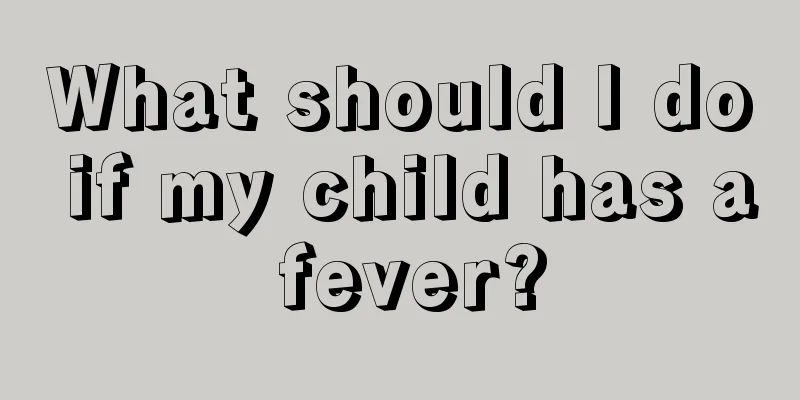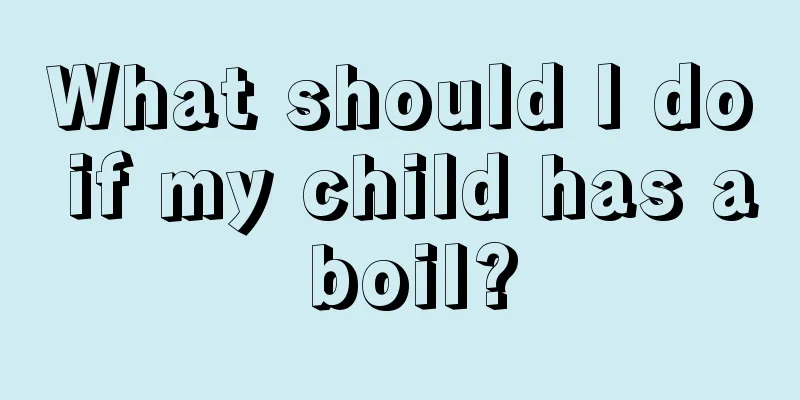Is it serious if a child has a nose bleed?

|
Anyone who has children at home knows that children are naughty. When he is at home, he can make the house a mess, with toys and socks scattered everywhere; when he goes out to play, if you don't pay attention to him for a minute, you can tell which corner he will run to. It is children’s nature to love playing, and we should respect nature. However, children often bump into things while playing, and sometimes even hit their noses. Is it serious if a child’s nose bleeds? Children are particularly prone to nosebleeds, especially in the dry autumn season when nosebleeds often occur in babies, so we must pay attention to daily care of young children in daily life. So, why does a three-year-old have a nosebleed when he hits his nose? The nose is very fragile and once it is injured, it is easy to cause nasal bleeding. Therefore, trauma is one of the common causes of nosebleeds. Let me introduce it to you below. What should you pay attention to when your baby has nose bleeding? Nosebleed is both a symptom of many diseases and a disease. Because the symptoms of nosebleed can be mild or severe, they cannot be ignored. When nose bleeding occurs, you should pay attention to the following issues. 1. Avoid panic. Children are still young and are often at a loss when bleeding occurs suddenly. At this time, parents should first stay calm and guide their children to take slow and deep breaths to fully relax. 2. Avoid lying on your back. Do not place your child on his back if he has a nosebleed. Because when lying on your back, blood will flow from the posterior wall of the pharynx into the esophagus and stomach, and will soon be vomited out from the stomach, which covers up the truth of the nosebleed. Let the child take a sitting or semi-sitting position, and pay attention to keeping the airway open to prevent blood from flowing into the mouth through the posterior nasal cavity. Instruct the child to spit out the blood that flows into the mouth as much as possible to prevent the blood from irritating the gastrointestinal tract and causing nausea and vomiting after being swallowed, or the child from accidentally inhaling it into the respiratory tract and causing suffocation. 3. Avoid using paper rolls or cotton to stuff things in. Not only will this fail to stop bleeding, but unclean paper rolls and cotton will cause inflammation. 4. Press the nose wings tightly. Parents should use the second knuckles of the thumb and index finger to press tightly on both sides of the child's nostrils, because children's nose bleeding is usually in the front part of the nasal septum, and pressing both sides of the nostrils can usually stop the bleeding. In addition, you can apply a cold towel to the child's forehead to help stop the bleeding. Even if the nose bleeding stops, you should go to the hospital for examination to rule out blood system diseases first. If the bleeding is caused by rupture of the nasal mucosa and small blood vessels are exposed, it can be treated in time to avoid further bleeding. Below, the editor will introduce to you what causes nose bleeding in children. 1. Acute febrile infectious diseases: In childhood, some infectious diseases with rapid onset and high fever often occur, especially upper respiratory tract infections. When high fever occurs, the blood vessels of the skin and mucous membranes throughout the body become congested and swollen, and the nasal mucosa also undergoes such pathological changes. Acute congestion and swelling of the nasal mucosa are more likely to cause rupture and bleeding, because the blood vessels of the nasal mucosa are superficial. Once the fever is severe, coupled with the external force of blowing the nose hard, the blood vessels under the mucosa will rupture and bleed. 2. Trauma: The nose is an organ exposed on the body surface. Once trauma occurs, such as blows or falls, the nose will naturally be the first to be affected. Under the impact of severe trauma, the blood vessels under the mucosa will rupture and bleed. 3. Picking the nose: Strictly speaking, picking the nose should also be included in the scope of trauma. Out of curiosity and discomfort, children often like to use their fingers to dig blindly in their nasal cavity. This is a bad habit that is not only unhygienic but also easily causes local nasal mucosal bleeding. The place where people usually pick their nose is at the front and lower part of the nasal septum. There are many blood vessels in this area, and many tiny blood vessels are interwoven into a network like a spider web. The blood vessels are superficial and very thin, and are located at the opening of the nasal cavity. Just digging with your hands can break the blood vessels. More than 90% of nosebleeds in children occur here. |
<<: What to do if your child has anal fissure bleeding
>>: What to do if your child has a bleeding nose
Recommend
At what age can a baby stop drinking milk powder?
Breastfeeding is a very traditional feeding metho...
What are the main symptoms of zinc deficiency in infants and young children?
Zinc deficiency in children is a topic that can n...
Symptoms of fish bones stuck in children's mouths
Many people like to eat fish, and there are many ...
What to do if a newborn baby has inflammation
Newborns are prone to respiratory infections, whi...
What happens when children cough while sleeping?
Many children sometimes cough when they sleep at ...
What are the symptoms of Down syndrome?
Currently, there are more and more children with ...
What's wrong with a girl's blood in her urine? Is it serious?
Some parents will find that their girls are actua...
When do girls develop breasts?
The breast is a very important part for women. It...
What causes high blood sugar in children?
In daily life, hyperglycemia is a common symptom....
How to supplement iron deficiency in a two-year-old baby?
In life, if a 2-year-old baby appears pale and li...
What is the reason why babies fart and poop?
Newborn babies cannot defecate independently beca...
Why does the baby have a fever and cold hands and feet?
When a baby is sick and has a fever, it makes eve...
How to treat tinea pedis in children
Tinea pedis is a very annoying disease that cause...
How to deal with baby's burns and broken skin
Babies are lively and active, and they are very c...
How tall can a person with a bone age of 13 grow?
In daily life, a child's height is actually m...









